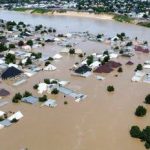
WHO Predicts 5.1 Million Shortfall in Nurses, Midwives by 2030

The World Health Organisation (WHO) has predicted a shortfall of 4.8 million nurses and 0.31 million midwives by 2030, despite the current presence of 29 million nurses and 2.2 million midwives worldwide.
This shortage is particularly acute in Africa, Southeast Asia, the Eastern Mediterranean, and parts of Latin America, as highlighted in the WHO statement for the 2024 International Nurses Day, ‘Our Nurses. Our Future. The economic power of care’.
The global health body described nurses and midwives as the backbone of healthcare systems, influencing policies, driving primary care, and essential for emergency response.
Stressing that nurses and midwives are crucial for emergency response and the overall sustainability of healthcare, WHO also noted that women comprise a significant portion of the healthcare workforce, with 67 per cent in the health and social sector compared to 41 per cent across all employment sectors.
With women comprising a significant majority of the healthcare workforce, WHO stressed that investing in nurses and midwives is vital for global health outcomes, as evidenced by studies linking their presence to enhanced service coverage, increased life expectancy, and reduced infant mortality rates.
In its words, “Nursing and midwifery are particularly female-dominated professions. Over 80 per cent of the world’s nurses work in countries with only half the global population. Additionally, a significant number of nurses (one in eight) practice in a different country than where they were born or trained.
“A higher number of female nurses correlates with positive health outcomes. Studies show a positive association with health service coverage and life expectancy and a negative correlation with infant mortality.
“Investing in nurses and midwives is essential for building efficient, effective, and sustainable healthcare systems worldwide. By addressing the global nursing shortage, the world can ensure everyone can access quality healthcare.
“Investing in Nurses for a Healthier Future: The positive correlation between the number of female nurses and health outcomes underscores the importance of supporting this workforce.
“Studies show a link between higher levels of female nurses and improved health service coverage, life expectancy, and lower infant mortality rates.”
Read: Natural Hues, Deep Roots: Afrikastabel’s Sustainable Threads of Nigeria
About The Author
Related Articles
Cotê D’Ivoire: Thousands Rally in Abidjan as Opposition Demands Electoral Reforms Ahead of October Election
Thousands of opposition supporters gathered in Abidjan on Saturday, May 31, to...
ByJoy ChukwuJune 1, 2025Togo Stops Issuing Mining Permits to Reform Outdated Mining Code
Togo has suspended the issuance of new mining permits for prospecting and...
ByJoy ChukwuJune 1, 2025ICYMI: Ghana Shuts Down Washington Embassy Over Visa Fraud Scandal
Ghana has temporarily closed its embassy in Washington, D.C., following the uncovering...
ByJoy ChukwuMay 31, 2025Confederation of Sahel States Moves to Establish Joint Judicial Body
The Confederation of Sahel States (CSS), comprising Mali, Niger, and Burkina Faso,...
ByJoy ChukwuMay 31, 2025











